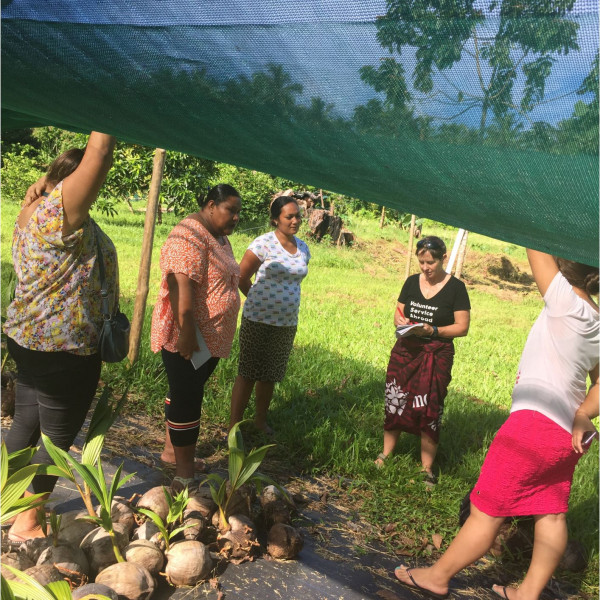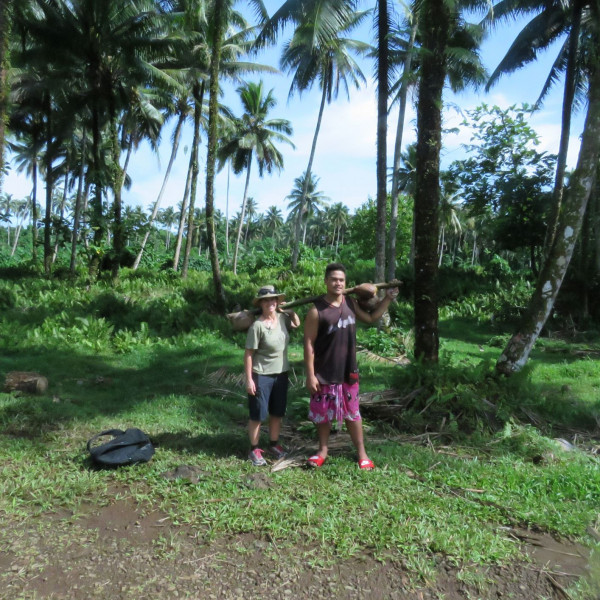26.05.2020 - When volunteer business adviser Jackie Aveling looks out of her window in the New Zealand autumn, in her mind’s eye she sees waving plantations of coconut palms.
In March Jackie and her husband Michael were on the ground in tropical Samoa, working with local coconut farmers to improve their business management and sustainable practice. But COVID-19 struck, and after just seven weeks on the job, they boarded a plane back to New Zealand. Now Jackie can’t wait to go back.
“We left New Zealand on 3 February and got back here on 20 March,” Jackie says. “But in that time we got a good understanding of the local culture and the lay of the land. There are three partners involved in this project so it was a matter of seeing how they all fit together.”

The three partners in question are the Savai’i Coconut Farmers Association (SCFA), its local buyer Krissy Co – producer of export quality Savai’i Popo coconut cream – and Fairtrade ANZ.
Originally from South Africa, Jackie was an ideal pick for the assignment, having a farm management and business mentoring background along with a strong interest in sustainable rural communities and agriculture.
“My first two weeks were tough, “she admits. “The meeting with Krissy’s production manager was brilliant. I learnt very quickly that what they needed was a steady supply of enough coconuts of the right specifications.”
Jackie says she started to get push through after spending time in the plantation with individual farmers.
“Initially the association members and leadership team sat for hours in the meeting fale (house) discussing association matters in Samoan,” she says. “It was only by talking with individual farmers on the plantations that we could see where the gaps in knowledge were – and the opportunities for introducing change.
“Happily by the time of the second association meeting the farmers were asking us to come and assess their plantations and share knowledge they could pass around their village.”
The basic problem facing the farmers is that the trees date from the time of the German protectorate in the early 1900s and are now “senile”, producing fewer and smaller coconuts. Non-improved plant varieties, a lack of nutrients in the soil and inadequate spacing between plants means that new self-germinated seedlings from these ageing trees fail to thrive.
“The farmers take great care of their short-term taro crops, but there’s less understanding of the factors for sustaining good long-term production of coconuts,” Jackie explains. The farmers tend to blame outside factors like cyclones or foraging cows for their poor crops.
The challenge is that Krissy need coconuts of a certain size and fat percentage to maintain the standard of their premium brand. The smaller coconuts don’t deliver the same quality of coconut cream so they end up being used for copra, which is of lower value.
“If you want the best coconuts, you want the best long term sustainable practice.”
In response, Jackie used the knowledge she had acquired to draw up a timeline allowing three months for developing the right business model, and the next nine months for educating and demonstrating leading to widespread adoption.
The new business model involves setting up a tree nursery using improved cultivars from the Ministry of Agriculture and Fisheries followed by a demonstration farm in five villages.
“We will work with the farmers showing them how to space between plants and how to prepare the soil for planting,” Jackie says.
“If we have that demonstration model in each village then we can say ‘This is the day we are demonstrating planting’ and the whole village can come and watch,” Jackie explains. “We can take photos and create a manual for the village.
“I’ve put together a simple composting guide – there’s so much green waste that can be used to improve soil organic matter and provide nutrients.”

Jackie learning from one of the members son's how to carry coconuts out from the plantation.
Jackie says the secret to sustainability is motivating farmers to take responsibility for the future of the coconut palms which will give their children a livelihood.
“To create the necessary uptake, the goals need to be theirs – not mine,” she says. “They need to do all this of their own accord.”
“Seventy percent of Samoa’s GDP comes from remittances. COVID-19 has prevented seasonal workers from coming to New Zealand to make money, and it’s also stopped tourism. To help reduce its vulnerability Samoa needs more focus on the export of agricultural products.”
